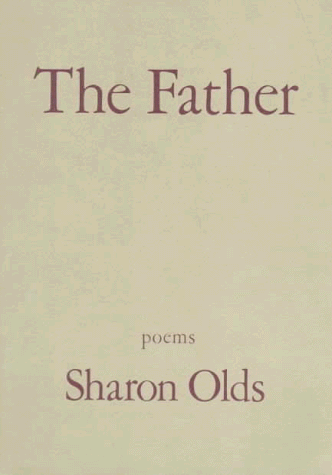I brought this book with me to read while I cared for my father but couldn't get through it, at first, since I didn't want her concept of her father to interfere with mine--she wrote in the opening poem, "The Waiting":
he knew he was dying,and
he seemed to approach it as a job to be done
he had
a way of holding still to be looked at,
as if a piece of sculpture could
sense the gaze which was running over it

In a few lines, Olds captures her father's character--impassive, perhaps unobtainable, statuesque, even godlike with the final overture to the Biblical book of Genesis. While vivid, hers shared little with mine, so I set hers aside until I'd finished my own set.
She has a quirky motif of her being inside her father, and her father inside her. In one, it reads as if she saw herself as a homunculus riding in her father's gonads; later, it's half of herself. The best of these is "Nullipara" which Kindle readers highlighted as well. She points out how her father stops a conversation to cut dangling string from her nightie. She closes:
He knows he will live in me
after he is dead, I will carry him like a mother,
I do not know if I will ever deliver.
"The Pulling" ends similarly--"as if my father could live and die / safely inside me"--although this one is emotionally strange and more complex. His various loss of functions somehow makes her God. The God is another odd motif ringing in these pages.
There's a submerged, lingering sense that she may not fully know her father. He puts a hand over her mouth when she's sobbing and she equates this with an Electra-complex image. Perhaps more is going on or has gone on than is presently on these pages, and maybe Freud hit the mark for some, but it certainly creates an alien vibe. It's hard to tell if it's meant as a metaphor, literal desire, desire consummated, or stirring the pot (although the those doesn't really suggest the lattermost). To keep this blog post PG instead of PG-13 or so, I'll leave off quoting other passages (not graphic, just odd--although maybe this is common).
Touching moments dot the book, especially when he's passing and just passed. She has a whole poem dedicated to "His Smell" and "The Dead Body" mirrors some of the attachment I still felt toward my father: "I hated it, after he died, that we would sometimes/leave him alove in the room." From "The Last Day":
I
moved his head to set it straight on the pillow,
it moved so easily, and his ear
gently crushed for the last hour,
unfolded in the air.
Although mixed feelings appear, towards the end, hate rears. It seems leavened with love, later, but these raw patches come up where anger flares. Note, though, in "Letter to My Father at 40,000 feet" this is just after she sees a salesman on a plane who looks like her father, whom she wants to hug:
when I'm dead I will be
facing you, my non-self
aiming this ardent non-love
steadily toward you. I guess I am saying
I hate you, too
"Waste Sonata" discusses more of this in terms of waste: "I love the terms of foulness. I have learned / to take pleasure from speaking of pain."
I saved the poem I had the most complex reaction to for last--"Death and Morality"--because it so angered me I put the book down. Was I still too close to my own father's death then? I'm not sure. After waiting a few month, I was able to read it. It begins "My father's dying is not evil. / It is not good and it is not evil." I had to inhabit it awhile to figure out my initial agitation. It could have been me, of course, but who suggested that some morality was involved? Is the poem an indictment of those who are angry when a loved one dies? angry at God, at doctors, at whatever or whomever? I'm not sure. Anyway, what was interesting to me was my own reaction. Does this make the poem good or bad, evil or indifferent? Read it for yourself and decide.

No comments:
Post a Comment